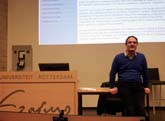 Rotterdam, 10 February 2015
Rotterdam, 10 February 2015
What are your experiences in communicating the work of the Tribunal to the victims? What kind of projects the ICTY conducts to reach out to young people in the Balkans? Is the work of the ICTY perceived differently in different countries and regions of the former Yugoslavia?
This is a sample of the many questions which interested a group of 20 students and lecturers of the bachelor programme in Communications and Media of the Erasmus University in Rotterdam, following today’s lecture delivered by the ICTY Outreach Officer, Nenad Golčevski.
The first part of the lecture entitled “Communicating justice to post-conflict societies in the former Yugoslavia” provided an overview of challenges and tasks that the post-conflict societies of the former Yugoslavia deal with in their attempts to face the recent, violent past. In the second part of the talk, Nenad spoke about the Tribunal’s efforts to bring its work closer to the people and communities which are most affected by it, and the various projects conducted by the ICTY Outreach Programme aimed at bridging the gap between The Hague and the Balkans. The lecture also included brief video excerpts of some of the testimonies given before the Tribunal, which left a strong impression on both students and lecturers in attendance.
One of the lecturers, Emy Koopman, commented on the reasons why Nenad’s talk was so interesting for her students: It is very valuable for them to have such an opportunity to hear, first-hand, about the communication efforts and the variety of approaches the Tribunal takes to reach the people in the Balkans, and to make its work understandable to them. This lecture has provided both the context and the content of those efforts, and that enabled our students to think in a different way about concepts such as victimhood, international justice and responsibility.
The lecture was organized jointly by the Erasmus School of History, Culture and Communication, and the ICTY Outreach Programme.

